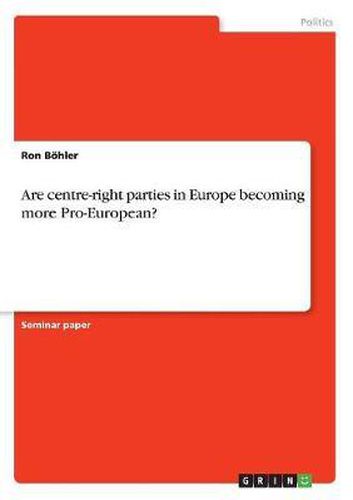Readings Newsletter
Become a Readings Member to make your shopping experience even easier.
Sign in or sign up for free!
You’re not far away from qualifying for FREE standard shipping within Australia
You’ve qualified for FREE standard shipping within Australia
The cart is loading…






Seminar paper from the year 2010 in the subject Politics - International Politics - Topic: European Union, grade: 2.3, University of Bath, language: English, abstract: This essay examines how centre-right parties in Central and Eastern Europe change in their ambitions to become a member of the European Union. The study will briefly categorize centre-right parties in post-communist Central and Eastern Europe (CEE) in order to identify relevant case studies. It is then assumed that ongoing European integration processes have an apparent impact on the domestic level, and in particular on parties opportunity structures within the national political arena. In the end, they inevitably adapt to these external pressures by either reacting receptive or by criticizing or rejecting the European project. Based on this assumption, the second part addresses the programmatic development and stance on Europe of major centre-right parties in Slovakia, Hungary and the Czech Republic between 1990 and 2006. In the same way that the European Union (EU) generally has deepened its policies and widened its geographic silhouette for decades, centre-right parties would be expected to become more ‘pro-European’. In contrast, the aim of this essay is too prove this assumption wrong. While some comprehensive studies indicate such an interrelation for Western European centre-right parties, this does not bear in cases of centre-right parties in Central Eastern European (CEE) countries. These parties were all too enthusiastic about the break-down of the communist Soviet Union and the incipient era of democratic and economic transition and proclaimed accession to the European Union as an immediate necessity in their foreign policy agendas.
$9.00 standard shipping within Australia
FREE standard shipping within Australia for orders over $100.00
Express & International shipping calculated at checkout
Seminar paper from the year 2010 in the subject Politics - International Politics - Topic: European Union, grade: 2.3, University of Bath, language: English, abstract: This essay examines how centre-right parties in Central and Eastern Europe change in their ambitions to become a member of the European Union. The study will briefly categorize centre-right parties in post-communist Central and Eastern Europe (CEE) in order to identify relevant case studies. It is then assumed that ongoing European integration processes have an apparent impact on the domestic level, and in particular on parties opportunity structures within the national political arena. In the end, they inevitably adapt to these external pressures by either reacting receptive or by criticizing or rejecting the European project. Based on this assumption, the second part addresses the programmatic development and stance on Europe of major centre-right parties in Slovakia, Hungary and the Czech Republic between 1990 and 2006. In the same way that the European Union (EU) generally has deepened its policies and widened its geographic silhouette for decades, centre-right parties would be expected to become more ‘pro-European’. In contrast, the aim of this essay is too prove this assumption wrong. While some comprehensive studies indicate such an interrelation for Western European centre-right parties, this does not bear in cases of centre-right parties in Central Eastern European (CEE) countries. These parties were all too enthusiastic about the break-down of the communist Soviet Union and the incipient era of democratic and economic transition and proclaimed accession to the European Union as an immediate necessity in their foreign policy agendas.